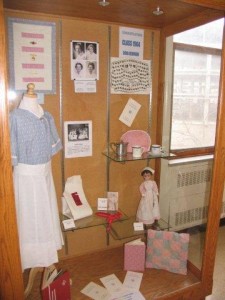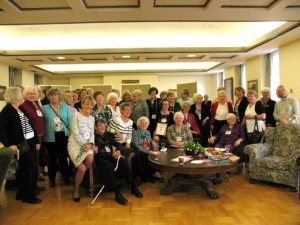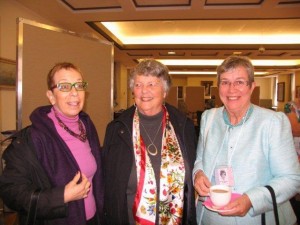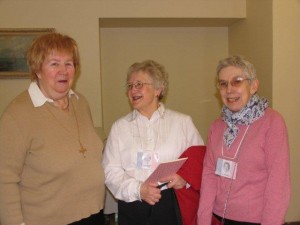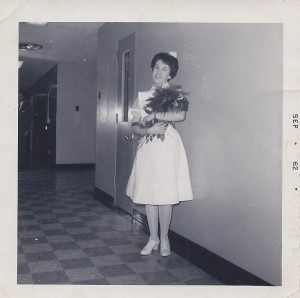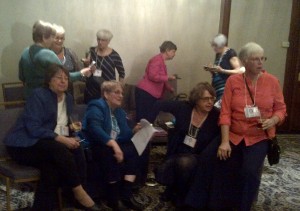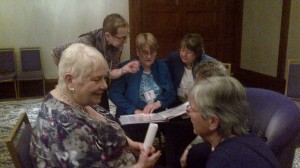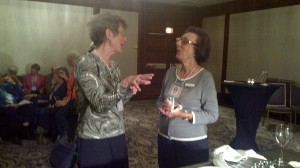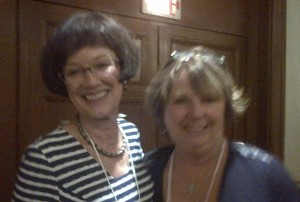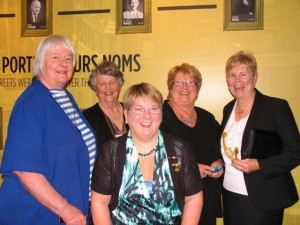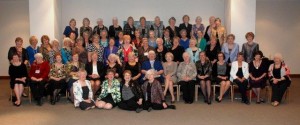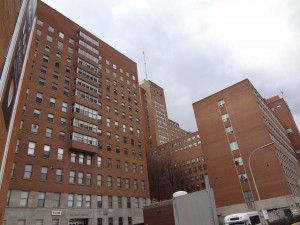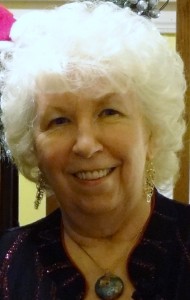(May 1-3, 2014, was reunion weekend for graduates of the Montreal General Hospital School of Nursing. Our class, the Class of 1964, celebrated the 50th anniversary of our graduation. Please click on the photos for a larger version. The quality of the photos is not consistent.)
Friday morning: The Livingston Hall Coffee Party
There was a glass case just outside the lounge in Livingston Hall. I was waiting for my classmates and I was looking at our class’s memorabilia which was on display.
“Who are they?” I heard someone ask.
“They’re nurses who used to work here. They came back for a reunion,” said another voice. “They used to wear proper uniforms and a cap.” After a few disparaging remarks about how nurses have changed, he went on. “They were real nurses,” he said fondly.
The questioner was a young man in uniform – probably a porter – and the middle-aged man answering the questions was from housekeeping. “You’re one of them, aren’t you?” he said to me.
I assured him I was and we had a lively conversation about what Livingston Hall used to be like. They were interested to hear that it was our home as well as our school – I pointed out the nearby elevators and told them about our rooms and some of the fun we had there, as well as the more difficult times.
There are many highlights of our reunion weekends but the visit to Livingston Hall always stands out because it takes us back to a more familiar place than some of the other events. It’s there that our memories are waiting.
So many of us, for example, remembered Miss Herman, ever-vigilant, with her tape measure to make sure we didn’t have too much leg showing on our way to work. I was an expert at turning my waistband so my apron was a good two and half inches shorter than it was supposed to be. I wasn’t nearly as good at avoiding Blanche but on the days I did, I always had a better day.
When a few classmates and I walked along the corridor between Livingston Hall and the hospital lobby – with a stop at the Hop Shop, of course – we slowed down to pay homage to Mrs. MacLeod near where her office was. A little further on, we remembered – by name – our evening and night supervisors. We remembered some more fondly than others.
Since graduation, we’ve lost 12 of our classmates. There are some we’ll always remember as the girls they were when they left us, far too soon. Others, lost more recently, are still mourned, still causing us to say, “I can’t believe it. It seems like only yesterday that we talked.” Whenever we meet, our missing classmates are there, if only fleetingly, because in some small ways, we ask time to stand still for that kind of remembering.
Thursday evening: Reception at the Omni
We had 56 members of our class attend our reunion – an excellent turnout for a class that graduated 108 students 50 years ago. We were in varying stages of mobility and health and, as we’ve observed before, some of us are instantly recognizable having retained at least some of our identifiable characteristics. Others of us must try to keep our nametags front and centre to try and minimize any embarrassment and to avoid those awkward whispers of, “Who is that anyway?”
Our sense of fun remains intact and we enjoyed the Omni. Our Thursday reception, the first point of contact unless we had run into each other in the lobby, was a party of perpetual motion and musical chairs as we tried to talk to everyone at once.
Friday evening: Dinner at the Omni
We all went to dinner wearing funny glasses, emblematic of the 50-year class. We stayed up late, got up relatively early, commiserated with those who are going through a rough patch, admired photos of grandchildren, new digs, momentous life events. We talked and talked and talked.
In the end, we behaved like the sisters we are. Sisters, not by virtue of blood or relationship, but sisters in life experience and in shared memories.
Because we don’t want it to be over, we’re all prepared to do it again, whenever we can.


